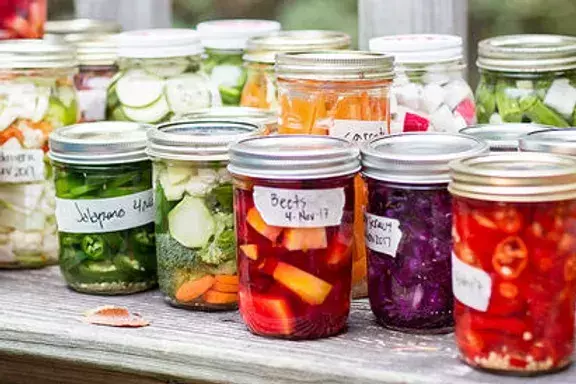
Fermented vegetables have been a staple in traditional diets for centuries, and for good reason! Beyond their bold flavors and satisfying crunch, they offer amazing health benefits that can transform your digestion, nutrition, and overall well-being. Let’s explore why adding lacto-fermented vegetables to your diet is a game-changer.
1. Fermented Vegetables Are Easier to Digest
Did you know that vegetables become much easier to digest when fermented? Lacto-fermentation is a natural process where beneficial bacteria “pre-digest” food, breaking down complex compounds that can be hard on our digestive system. This process:
- Creates enzymes that aid digestion
- Reduces carbohydrates and oligosaccharides (the compounds that cause bloating and gas)
- Makes fibrous vegetables like cabbage (sauerkraut) gentler on the stomach
Fermented foods have even been shown to help alleviate symptoms of chronic digestive issues like irritable bowel syndrome (IBS), making them a great option for those with sensitive stomachs.
2. Fermentation Increases Nutrient Levels
Fermentation doesn’t just preserve food—it enhances it! This process boosts nutrient levels and improves absorption in ways that raw or cooked vegetables can’t match. During fermentation, beneficial bacteria produce essential nutrients, including:
- Vitamin C – Supports the immune system and skin health
- B Vitamins (including B12) – Vital for energy and brain function
- Vitamin K – Crucial for bone and heart health
- Amino acids, enzymes, and antioxidants – Improve overall health and cellular function
Even better, fermentation neutralizes harmful compounds like phytates, cyanide, and saponins, which can block nutrient absorption. Studies have also shown that fermented vegetables enhance the bioavailability of iron and zinc, making them easier for your body to absorb.
3. Fermented Foods Support a Healthy Gut Microbiome
Your gut is home to trillions of bacteria that influence everything from digestion to immunity—even mood! Fermented vegetables are packed with probiotics (good bacteria) and prebiotics (food for beneficial bacteria), helping to:
- Strengthen digestion and nutrient absorption
- Balance the gut microbiome (often called the "second brain")
- Support immunity and reduce inflammation
Your gut microbiome plays a key role in:
- Breaking down food
- Regulating metabolism
- Strengthening the immune system
- Even influencing food cravings and mood!
Adding fermented vegetables to your diet is one of the simplest and most effective ways to boost gut health naturally.
4. Fermentation is a Natural and Safe Way to Preserve Food
One of the biggest advantages of lacto-fermentation is its ability to preserve food safely for long periods. Unlike raw vegetables, which spoil quickly, fermented foods:
- Have a long shelf life – Some can last months or even years when stored properly!
- Create an inhospitable environment for harmful bacteria – The fermentation process naturally prevents the growth of dangerous pathogens like E. coli, salmonella, and botulism.
- Retain nutrients better than canned or heat-processed foods – Making them a healthier preservation method.
With lacto-fermentation, your food isn’t just preserved—it becomes even more nutritious and beneficial over time.
5. Fermentation Unlocks Incredible Flavors
Beyond the health benefits, fermentation transforms the taste of vegetables, creating bold, complex flavors that can elevate any dish. The tangy, slightly sour, and umami-rich taste makes fermented foods a natural flavor enhancer for:
- Bland dishes – Add sauerkraut, kimchi, or pickles for a burst of flavor
- Salads & bowls – Toss in fermented veggies for extra texture and zest
- Marinades & sauces – Use brine from fermented vegetables for added depth
Did you know? Some lacto-fermented vegetables, like celery, can take on citrusy or anise-like flavors! Plus, fermentation enhances umami, the "fifth taste" that makes food incredibly satisfying.
Instead of relying on probiotic pills, why not enjoy real, flavorful food that nourishes your gut naturally?
6. Fermenting Vegetables at Home is Easy!
One of the best things about lacto-fermentation? Anyone can do it! You don’t need fancy equipment or special skills—just a few simple ingredients:
What You Need:
- Fresh vegetables of your choice
- Natural salt (like sea salt or Himalayan salt)
- A jar (glass works best!)
How It Works:
- Chop or grate your vegetables.
- Massage them with salt to release liquid.
- Pack them tightly into a jar, making sure they’re fully submerged in their own brine.
- Seal the jar and let it ferment at room temperature for a few days to weeks (depending on the flavor you want).
- Enjoy your homemade, probiotic-rich fermented vegetables!
That’s it—no special tools, no complicated steps, just real food transforming into a powerful, gut-boosting superfood.
Final Thoughts
Fermented vegetables are an easy, delicious, and powerful way to support your health. Whether you want to improve digestion, boost nutrient absorption, strengthen your microbiome, or simply add exciting new flavors to your meals—lacto-fermented foods are a must-try.
Why not start today? Pick your favorite vegetable, grab some salt, and experience the magic of fermentation!
Here are some recipes below:
- Sauerkraut
- Kimchi
- Fermented vegetables
- Book: Fermentation for Beginners: The Step-By-Step Guide to Fermentation and Probiotic Foods





